HSC210: Health Sociology Assessment on Public Health Issues
VerifiedAdded on 2022/12/19
|11
|2983
|7
Homework Assignment
AI Summary
This assignment solution for HSC210, a Health Sociology course, addresses key concepts in public health within the Australian context. It explores postmodernist perspectives and their implications for health practice, examines the persistent challenges in Indigenous health despite increased funding, and analyzes psychiatry through a sociological lens, considering it as a form of social control. The assignment further delves into the benefits and limitations of e-health, the influence of ideology and politics on health outcomes, and the application of functionalist theory. It also investigates medical dominance in Australia and the role of discourse in health and biomedicine, along with the complexities of multiculturalism and differing health needs of immigrants and refugees. Finally, it examines the social determinants of health and their role in understanding global inequity.
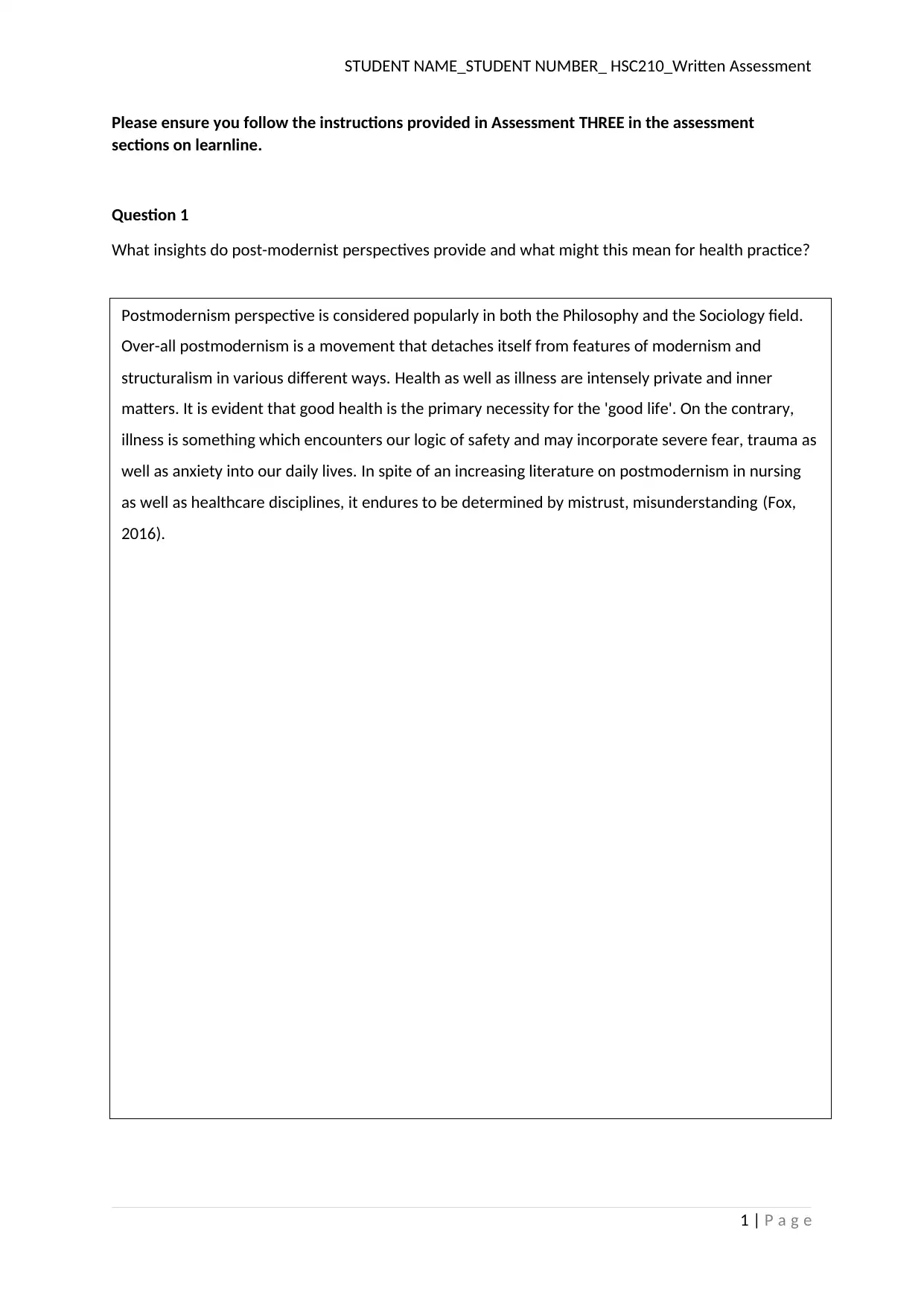
STUDENT NAME_STUDENT NUMBER_ HSC210_Written Assessment
Please ensure you follow the instructions provided in Assessment THREE in the assessment
sections on learnline.
Question 1
What insights do post-modernist perspectives provide and what might this mean for health practice?
1 | P a g e
Postmodernism perspective is considered popularly in both the Philosophy and the Sociology field.
Over-all postmodernism is a movement that detaches itself from features of modernism and
structuralism in various different ways. Health as well as illness are intensely private and inner
matters. It is evident that good health is the primary necessity for the 'good life'. On the contrary,
illness is something which encounters our logic of safety and may incorporate severe fear, trauma as
well as anxiety into our daily lives. In spite of an increasing literature on postmodernism in nursing
as well as healthcare disciplines, it endures to be determined by mistrust, misunderstanding (Fox,
2016).
Please ensure you follow the instructions provided in Assessment THREE in the assessment
sections on learnline.
Question 1
What insights do post-modernist perspectives provide and what might this mean for health practice?
1 | P a g e
Postmodernism perspective is considered popularly in both the Philosophy and the Sociology field.
Over-all postmodernism is a movement that detaches itself from features of modernism and
structuralism in various different ways. Health as well as illness are intensely private and inner
matters. It is evident that good health is the primary necessity for the 'good life'. On the contrary,
illness is something which encounters our logic of safety and may incorporate severe fear, trauma as
well as anxiety into our daily lives. In spite of an increasing literature on postmodernism in nursing
as well as healthcare disciplines, it endures to be determined by mistrust, misunderstanding (Fox,
2016).
Paraphrase This Document
Need a fresh take? Get an instant paraphrase of this document with our AI Paraphraser
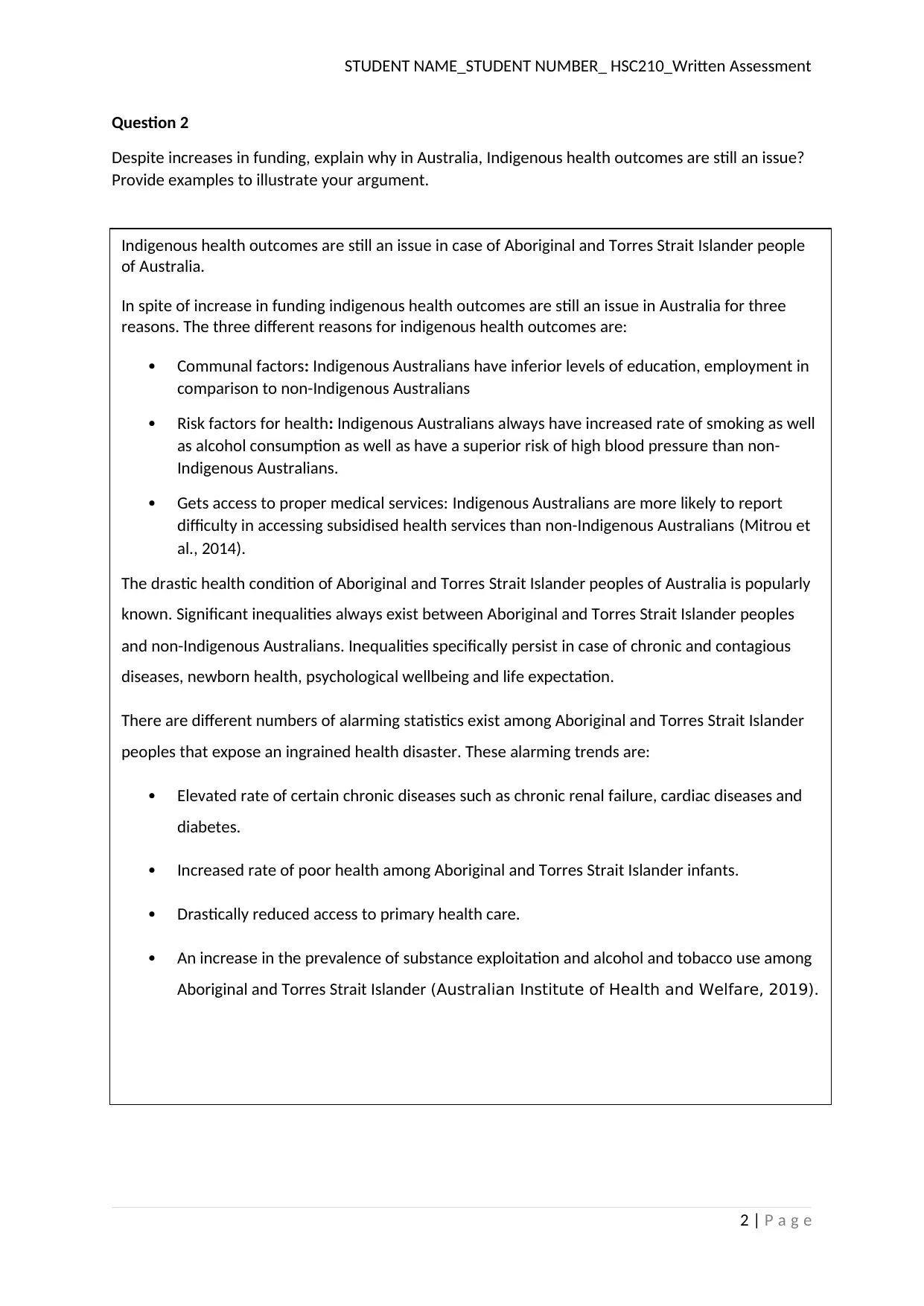
STUDENT NAME_STUDENT NUMBER_ HSC210_Written Assessment
Question 2
Despite increases in funding, explain why in Australia, Indigenous health outcomes are still an issue?
Provide examples to illustrate your argument.
2 | P a g e
Indigenous health outcomes are still an issue in case of Aboriginal and Torres Strait Islander people
of Australia.
In spite of increase in funding indigenous health outcomes are still an issue in Australia for three
reasons. The three different reasons for indigenous health outcomes are:
Communal factors: Indigenous Australians have inferior levels of education, employment in
comparison to non-Indigenous Australians
Risk factors for health: Indigenous Australians always have increased rate of smoking as well
as alcohol consumption as well as have a superior risk of high blood pressure than non-
Indigenous Australians.
Gets access to proper medical services: Indigenous Australians are more likely to report
difficulty in accessing subsidised health services than non-Indigenous Australians (Mitrou et
al., 2014).
The drastic health condition of Aboriginal and Torres Strait Islander peoples of Australia is popularly
known. Significant inequalities always exist between Aboriginal and Torres Strait Islander peoples
and non-Indigenous Australians. Inequalities specifically persist in case of chronic and contagious
diseases, newborn health, psychological wellbeing and life expectation.
There are different numbers of alarming statistics exist among Aboriginal and Torres Strait Islander
peoples that expose an ingrained health disaster. These alarming trends are:
Elevated rate of certain chronic diseases such as chronic renal failure, cardiac diseases and
diabetes.
Increased rate of poor health among Aboriginal and Torres Strait Islander infants.
Drastically reduced access to primary health care.
An increase in the prevalence of substance exploitation and alcohol and tobacco use among
Aboriginal and Torres Strait Islander (Australian Institute of Health and Welfare, 2019).
Question 2
Despite increases in funding, explain why in Australia, Indigenous health outcomes are still an issue?
Provide examples to illustrate your argument.
2 | P a g e
Indigenous health outcomes are still an issue in case of Aboriginal and Torres Strait Islander people
of Australia.
In spite of increase in funding indigenous health outcomes are still an issue in Australia for three
reasons. The three different reasons for indigenous health outcomes are:
Communal factors: Indigenous Australians have inferior levels of education, employment in
comparison to non-Indigenous Australians
Risk factors for health: Indigenous Australians always have increased rate of smoking as well
as alcohol consumption as well as have a superior risk of high blood pressure than non-
Indigenous Australians.
Gets access to proper medical services: Indigenous Australians are more likely to report
difficulty in accessing subsidised health services than non-Indigenous Australians (Mitrou et
al., 2014).
The drastic health condition of Aboriginal and Torres Strait Islander peoples of Australia is popularly
known. Significant inequalities always exist between Aboriginal and Torres Strait Islander peoples
and non-Indigenous Australians. Inequalities specifically persist in case of chronic and contagious
diseases, newborn health, psychological wellbeing and life expectation.
There are different numbers of alarming statistics exist among Aboriginal and Torres Strait Islander
peoples that expose an ingrained health disaster. These alarming trends are:
Elevated rate of certain chronic diseases such as chronic renal failure, cardiac diseases and
diabetes.
Increased rate of poor health among Aboriginal and Torres Strait Islander infants.
Drastically reduced access to primary health care.
An increase in the prevalence of substance exploitation and alcohol and tobacco use among
Aboriginal and Torres Strait Islander (Australian Institute of Health and Welfare, 2019).
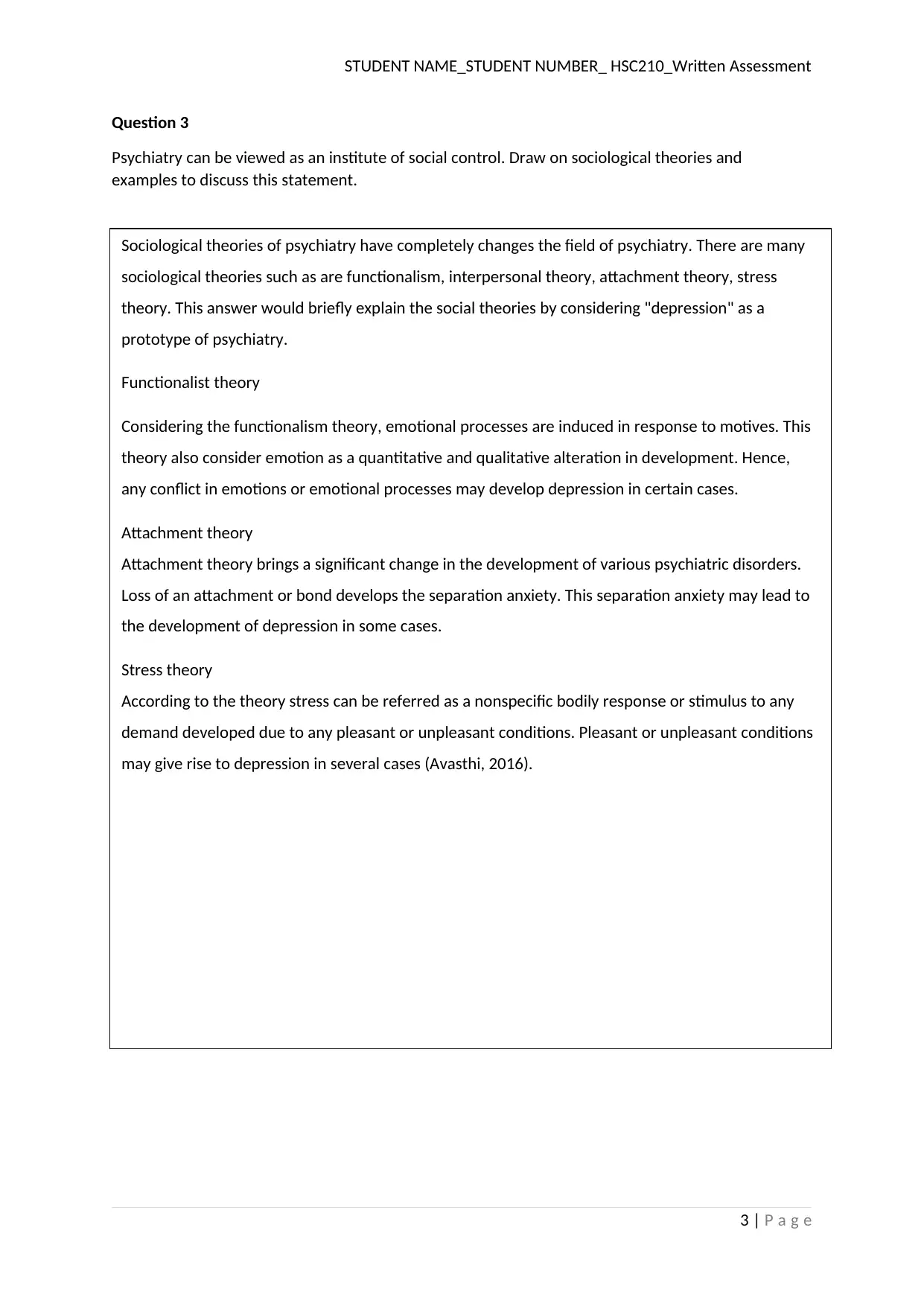
STUDENT NAME_STUDENT NUMBER_ HSC210_Written Assessment
Question 3
Psychiatry can be viewed as an institute of social control. Draw on sociological theories and
examples to discuss this statement.
3 | P a g e
Sociological theories of psychiatry have completely changes the field of psychiatry. There are many
sociological theories such as are functionalism, interpersonal theory, attachment theory, stress
theory. This answer would briefly explain the social theories by considering "depression" as a
prototype of psychiatry.
Functionalist theory
Considering the functionalism theory, emotional processes are induced in response to motives. This
theory also consider emotion as a quantitative and qualitative alteration in development. Hence,
any conflict in emotions or emotional processes may develop depression in certain cases.
Attachment theory
Attachment theory brings a significant change in the development of various psychiatric disorders.
Loss of an attachment or bond develops the separation anxiety. This separation anxiety may lead to
the development of depression in some cases.
Stress theory
According to the theory stress can be referred as a nonspecific bodily response or stimulus to any
demand developed due to any pleasant or unpleasant conditions. Pleasant or unpleasant conditions
may give rise to depression in several cases (Avasthi, 2016).
Question 3
Psychiatry can be viewed as an institute of social control. Draw on sociological theories and
examples to discuss this statement.
3 | P a g e
Sociological theories of psychiatry have completely changes the field of psychiatry. There are many
sociological theories such as are functionalism, interpersonal theory, attachment theory, stress
theory. This answer would briefly explain the social theories by considering "depression" as a
prototype of psychiatry.
Functionalist theory
Considering the functionalism theory, emotional processes are induced in response to motives. This
theory also consider emotion as a quantitative and qualitative alteration in development. Hence,
any conflict in emotions or emotional processes may develop depression in certain cases.
Attachment theory
Attachment theory brings a significant change in the development of various psychiatric disorders.
Loss of an attachment or bond develops the separation anxiety. This separation anxiety may lead to
the development of depression in some cases.
Stress theory
According to the theory stress can be referred as a nonspecific bodily response or stimulus to any
demand developed due to any pleasant or unpleasant conditions. Pleasant or unpleasant conditions
may give rise to depression in several cases (Avasthi, 2016).
⊘ This is a preview!⊘
Do you want full access?
Subscribe today to unlock all pages.

Trusted by 1+ million students worldwide
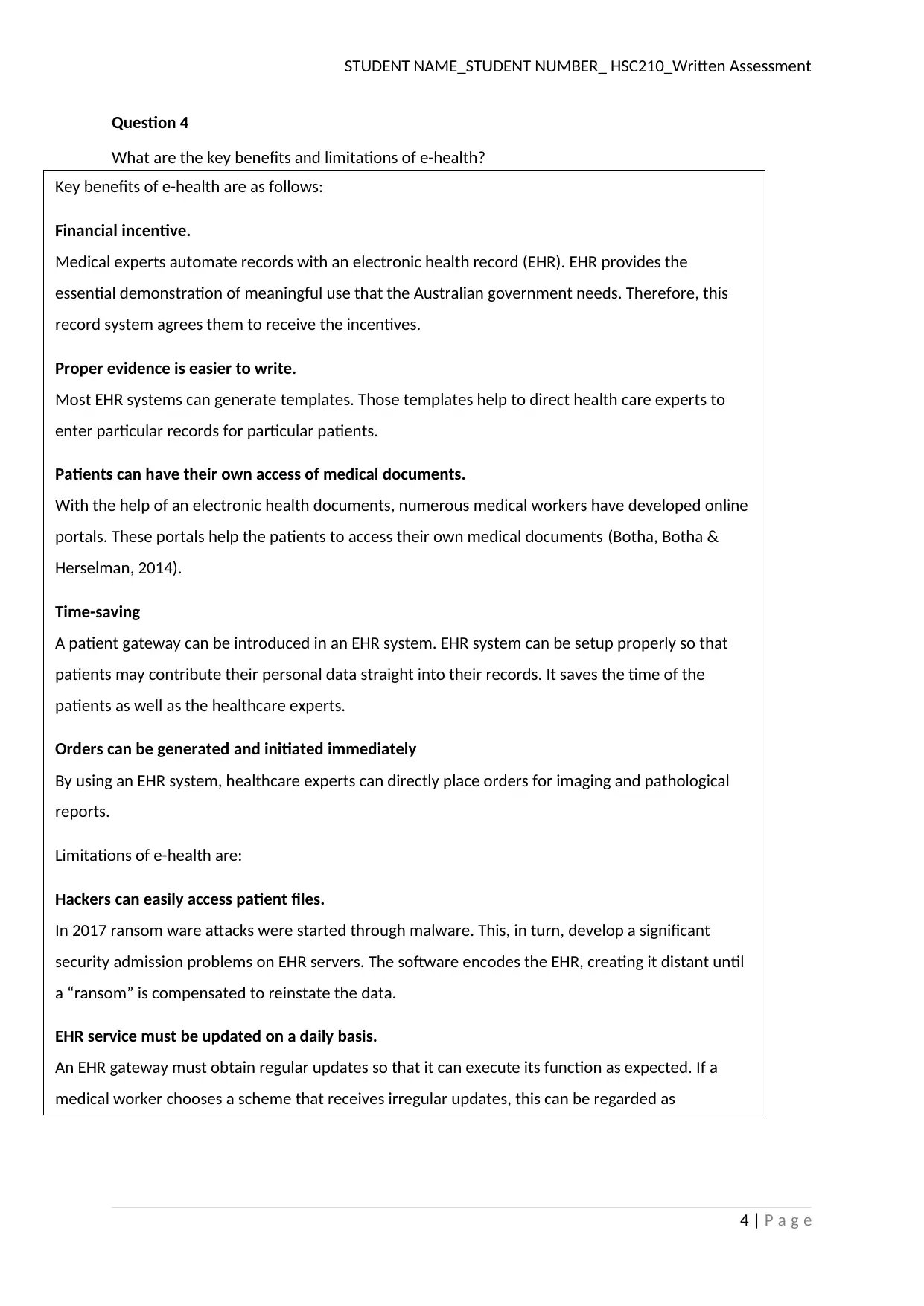
STUDENT NAME_STUDENT NUMBER_ HSC210_Written Assessment
Question 4
What are the key benefits and limitations of e-health?
4 | P a g e
Key benefits of e-health are as follows:
Financial incentive.
Medical experts automate records with an electronic health record (EHR). EHR provides the
essential demonstration of meaningful use that the Australian government needs. Therefore, this
record system agrees them to receive the incentives.
Proper evidence is easier to write.
Most EHR systems can generate templates. Those templates help to direct health care experts to
enter particular records for particular patients.
Patients can have their own access of medical documents.
With the help of an electronic health documents, numerous medical workers have developed online
portals. These portals help the patients to access their own medical documents (Botha, Botha &
Herselman, 2014).
Time-saving
A patient gateway can be introduced in an EHR system. EHR system can be setup properly so that
patients may contribute their personal data straight into their records. It saves the time of the
patients as well as the healthcare experts.
Orders can be generated and initiated immediately
By using an EHR system, healthcare experts can directly place orders for imaging and pathological
reports.
Limitations of e-health are:
Hackers can easily access patient files.
In 2017 ransom ware attacks were started through malware. This, in turn, develop a significant
security admission problems on EHR servers. The software encodes the EHR, creating it distant until
a “ransom” is compensated to reinstate the data.
EHR service must be updated on a daily basis.
An EHR gateway must obtain regular updates so that it can execute its function as expected. If a
medical worker chooses a scheme that receives irregular updates, this can be regarded as
limitations over time (Xu et al., 2013).
Question 4
What are the key benefits and limitations of e-health?
4 | P a g e
Key benefits of e-health are as follows:
Financial incentive.
Medical experts automate records with an electronic health record (EHR). EHR provides the
essential demonstration of meaningful use that the Australian government needs. Therefore, this
record system agrees them to receive the incentives.
Proper evidence is easier to write.
Most EHR systems can generate templates. Those templates help to direct health care experts to
enter particular records for particular patients.
Patients can have their own access of medical documents.
With the help of an electronic health documents, numerous medical workers have developed online
portals. These portals help the patients to access their own medical documents (Botha, Botha &
Herselman, 2014).
Time-saving
A patient gateway can be introduced in an EHR system. EHR system can be setup properly so that
patients may contribute their personal data straight into their records. It saves the time of the
patients as well as the healthcare experts.
Orders can be generated and initiated immediately
By using an EHR system, healthcare experts can directly place orders for imaging and pathological
reports.
Limitations of e-health are:
Hackers can easily access patient files.
In 2017 ransom ware attacks were started through malware. This, in turn, develop a significant
security admission problems on EHR servers. The software encodes the EHR, creating it distant until
a “ransom” is compensated to reinstate the data.
EHR service must be updated on a daily basis.
An EHR gateway must obtain regular updates so that it can execute its function as expected. If a
medical worker chooses a scheme that receives irregular updates, this can be regarded as
limitations over time (Xu et al., 2013).
Paraphrase This Document
Need a fresh take? Get an instant paraphrase of this document with our AI Paraphraser
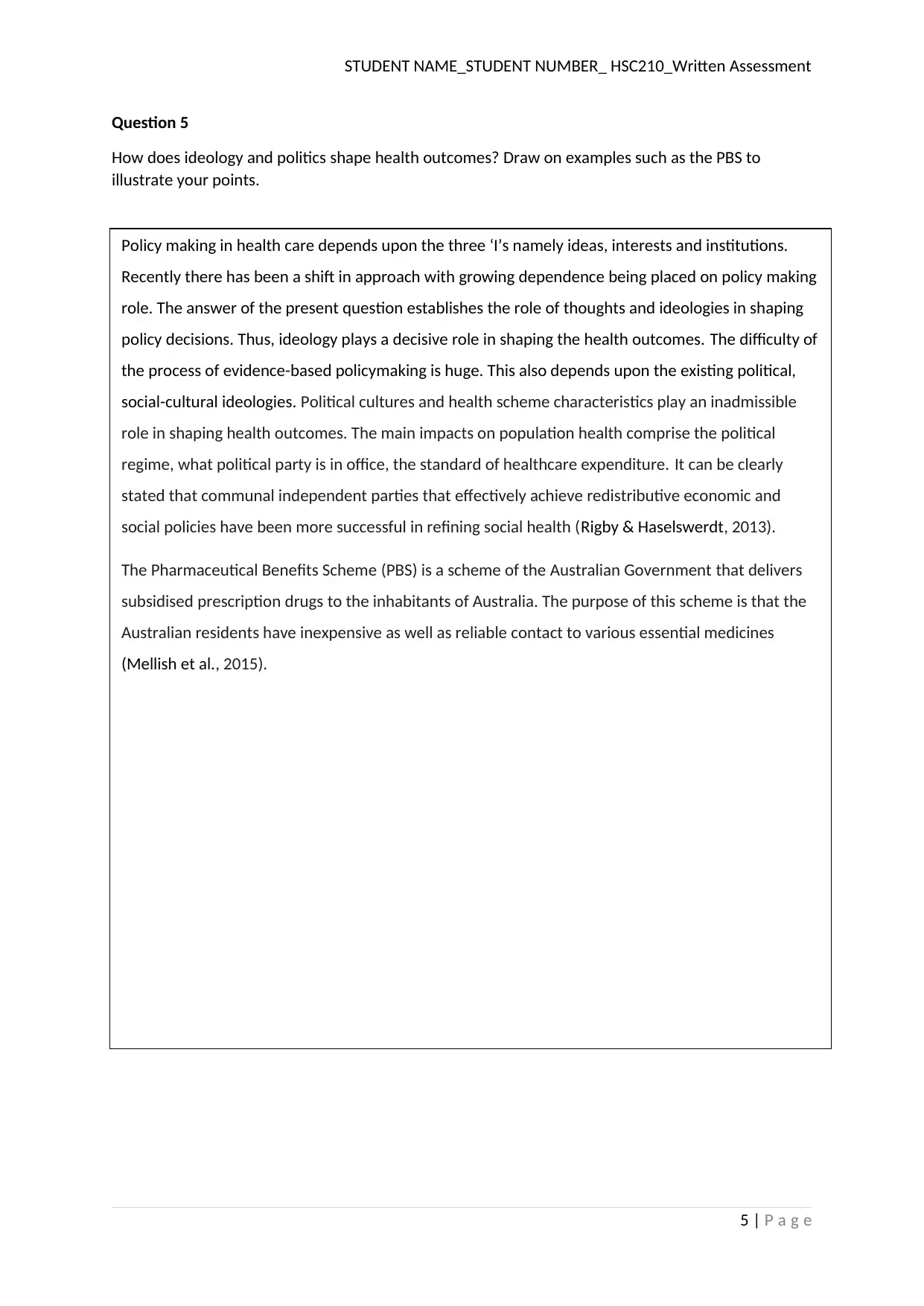
STUDENT NAME_STUDENT NUMBER_ HSC210_Written Assessment
Question 5
How does ideology and politics shape health outcomes? Draw on examples such as the PBS to
illustrate your points.
5 | P a g e
Policy making in health care depends upon the three ‘I’s namely ideas, interests and institutions.
Recently there has been a shift in approach with growing dependence being placed on policy making
role. The answer of the present question establishes the role of thoughts and ideologies in shaping
policy decisions. Thus, ideology plays a decisive role in shaping the health outcomes. The difficulty of
the process of evidence-based policymaking is huge. This also depends upon the existing political,
social-cultural ideologies. Political cultures and health scheme characteristics play an inadmissible
role in shaping health outcomes. The main impacts on population health comprise the political
regime, what political party is in office, the standard of healthcare expenditure. It can be clearly
stated that communal independent parties that effectively achieve redistributive economic and
social policies have been more successful in refining social health (Rigby & Haselswerdt, 2013).
The Pharmaceutical Benefits Scheme (PBS) is a scheme of the Australian Government that delivers
subsidised prescription drugs to the inhabitants of Australia. The purpose of this scheme is that the
Australian residents have inexpensive as well as reliable contact to various essential medicines
(Mellish et al., 2015).
Question 5
How does ideology and politics shape health outcomes? Draw on examples such as the PBS to
illustrate your points.
5 | P a g e
Policy making in health care depends upon the three ‘I’s namely ideas, interests and institutions.
Recently there has been a shift in approach with growing dependence being placed on policy making
role. The answer of the present question establishes the role of thoughts and ideologies in shaping
policy decisions. Thus, ideology plays a decisive role in shaping the health outcomes. The difficulty of
the process of evidence-based policymaking is huge. This also depends upon the existing political,
social-cultural ideologies. Political cultures and health scheme characteristics play an inadmissible
role in shaping health outcomes. The main impacts on population health comprise the political
regime, what political party is in office, the standard of healthcare expenditure. It can be clearly
stated that communal independent parties that effectively achieve redistributive economic and
social policies have been more successful in refining social health (Rigby & Haselswerdt, 2013).
The Pharmaceutical Benefits Scheme (PBS) is a scheme of the Australian Government that delivers
subsidised prescription drugs to the inhabitants of Australia. The purpose of this scheme is that the
Australian residents have inexpensive as well as reliable contact to various essential medicines
(Mellish et al., 2015).
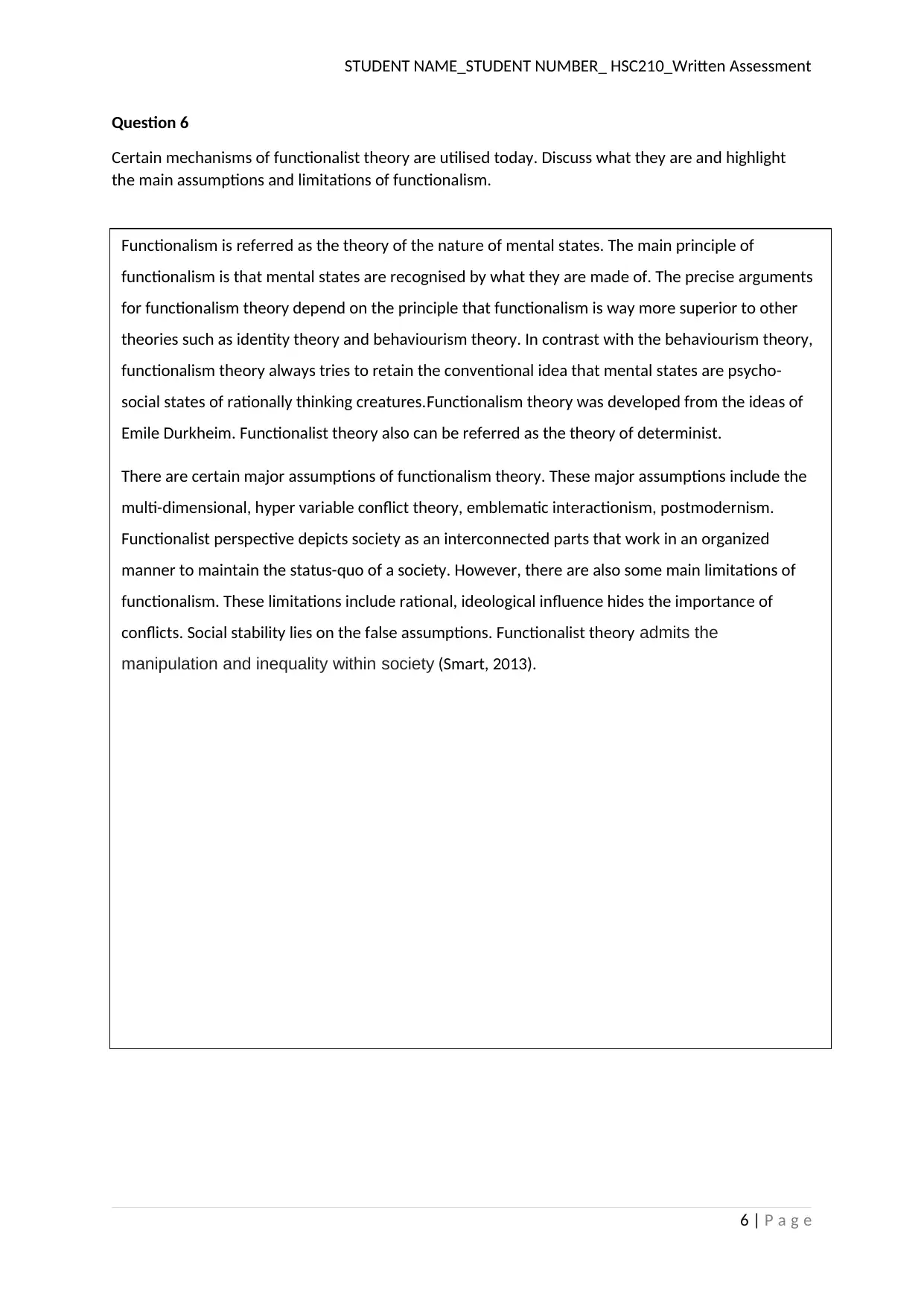
STUDENT NAME_STUDENT NUMBER_ HSC210_Written Assessment
Question 6
Certain mechanisms of functionalist theory are utilised today. Discuss what they are and highlight
the main assumptions and limitations of functionalism.
6 | P a g e
Functionalism is referred as the theory of the nature of mental states. The main principle of
functionalism is that mental states are recognised by what they are made of. The precise arguments
for functionalism theory depend on the principle that functionalism is way more superior to other
theories such as identity theory and behaviourism theory. In contrast with the behaviourism theory,
functionalism theory always tries to retain the conventional idea that mental states are psycho-
social states of rationally thinking creatures.Functionalism theory was developed from the ideas of
Emile Durkheim. Functionalist theory also can be referred as the theory of determinist.
There are certain major assumptions of functionalism theory. These major assumptions include the
multi-dimensional, hyper variable conflict theory, emblematic interactionism, postmodernism.
Functionalist perspective depicts society as an interconnected parts that work in an organized
manner to maintain the status-quo of a society. However, there are also some main limitations of
functionalism. These limitations include rational, ideological influence hides the importance of
conflicts. Social stability lies on the false assumptions. Functionalist theory admits the
manipulation and inequality within society (Smart, 2013).
Question 6
Certain mechanisms of functionalist theory are utilised today. Discuss what they are and highlight
the main assumptions and limitations of functionalism.
6 | P a g e
Functionalism is referred as the theory of the nature of mental states. The main principle of
functionalism is that mental states are recognised by what they are made of. The precise arguments
for functionalism theory depend on the principle that functionalism is way more superior to other
theories such as identity theory and behaviourism theory. In contrast with the behaviourism theory,
functionalism theory always tries to retain the conventional idea that mental states are psycho-
social states of rationally thinking creatures.Functionalism theory was developed from the ideas of
Emile Durkheim. Functionalist theory also can be referred as the theory of determinist.
There are certain major assumptions of functionalism theory. These major assumptions include the
multi-dimensional, hyper variable conflict theory, emblematic interactionism, postmodernism.
Functionalist perspective depicts society as an interconnected parts that work in an organized
manner to maintain the status-quo of a society. However, there are also some main limitations of
functionalism. These limitations include rational, ideological influence hides the importance of
conflicts. Social stability lies on the false assumptions. Functionalist theory admits the
manipulation and inequality within society (Smart, 2013).
⊘ This is a preview!⊘
Do you want full access?
Subscribe today to unlock all pages.

Trusted by 1+ million students worldwide
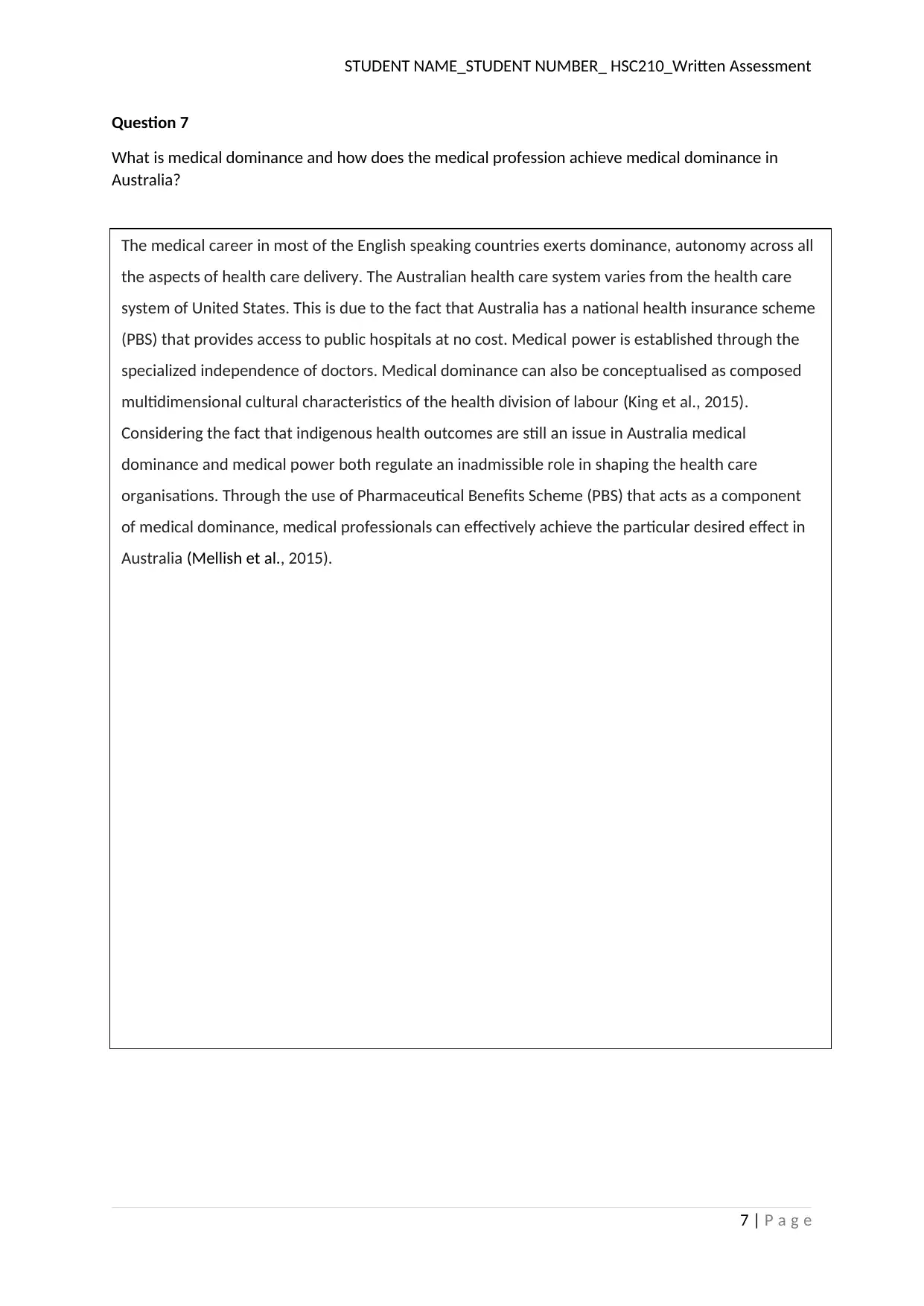
STUDENT NAME_STUDENT NUMBER_ HSC210_Written Assessment
Question 7
What is medical dominance and how does the medical profession achieve medical dominance in
Australia?
7 | P a g e
The medical career in most of the English speaking countries exerts dominance, autonomy across all
the aspects of health care delivery. The Australian health care system varies from the health care
system of United States. This is due to the fact that Australia has a national health insurance scheme
(PBS) that provides access to public hospitals at no cost. Medical power is established through the
specialized independence of doctors. Medical dominance can also be conceptualised as composed
multidimensional cultural characteristics of the health division of labour (King et al., 2015).
Considering the fact that indigenous health outcomes are still an issue in Australia medical
dominance and medical power both regulate an inadmissible role in shaping the health care
organisations. Through the use of Pharmaceutical Benefits Scheme (PBS) that acts as a component
of medical dominance, medical professionals can effectively achieve the particular desired effect in
Australia (Mellish et al., 2015).
Question 7
What is medical dominance and how does the medical profession achieve medical dominance in
Australia?
7 | P a g e
The medical career in most of the English speaking countries exerts dominance, autonomy across all
the aspects of health care delivery. The Australian health care system varies from the health care
system of United States. This is due to the fact that Australia has a national health insurance scheme
(PBS) that provides access to public hospitals at no cost. Medical power is established through the
specialized independence of doctors. Medical dominance can also be conceptualised as composed
multidimensional cultural characteristics of the health division of labour (King et al., 2015).
Considering the fact that indigenous health outcomes are still an issue in Australia medical
dominance and medical power both regulate an inadmissible role in shaping the health care
organisations. Through the use of Pharmaceutical Benefits Scheme (PBS) that acts as a component
of medical dominance, medical professionals can effectively achieve the particular desired effect in
Australia (Mellish et al., 2015).
Paraphrase This Document
Need a fresh take? Get an instant paraphrase of this document with our AI Paraphraser
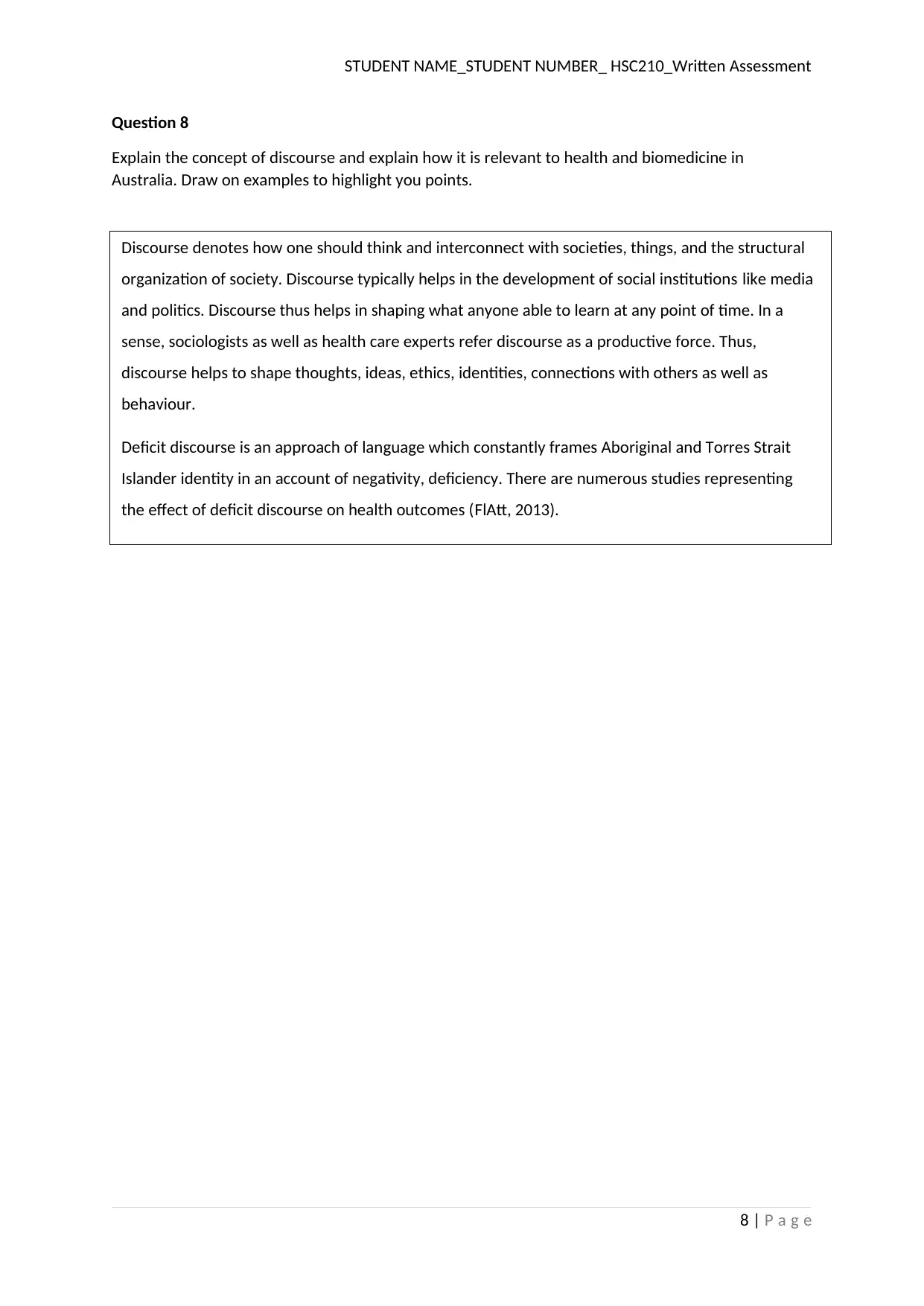
STUDENT NAME_STUDENT NUMBER_ HSC210_Written Assessment
Question 8
Explain the concept of discourse and explain how it is relevant to health and biomedicine in
Australia. Draw on examples to highlight you points.
8 | P a g e
Discourse denotes how one should think and interconnect with societies, things, and the structural
organization of society. Discourse typically helps in the development of social institutions like media
and politics. Discourse thus helps in shaping what anyone able to learn at any point of time. In a
sense, sociologists as well as health care experts refer discourse as a productive force. Thus,
discourse helps to shape thoughts, ideas, ethics, identities, connections with others as well as
behaviour.
Deficit discourse is an approach of language which constantly frames Aboriginal and Torres Strait
Islander identity in an account of negativity, deficiency. There are numerous studies representing
the effect of deficit discourse on health outcomes (FlAtt, 2013).
Question 8
Explain the concept of discourse and explain how it is relevant to health and biomedicine in
Australia. Draw on examples to highlight you points.
8 | P a g e
Discourse denotes how one should think and interconnect with societies, things, and the structural
organization of society. Discourse typically helps in the development of social institutions like media
and politics. Discourse thus helps in shaping what anyone able to learn at any point of time. In a
sense, sociologists as well as health care experts refer discourse as a productive force. Thus,
discourse helps to shape thoughts, ideas, ethics, identities, connections with others as well as
behaviour.
Deficit discourse is an approach of language which constantly frames Aboriginal and Torres Strait
Islander identity in an account of negativity, deficiency. There are numerous studies representing
the effect of deficit discourse on health outcomes (FlAtt, 2013).
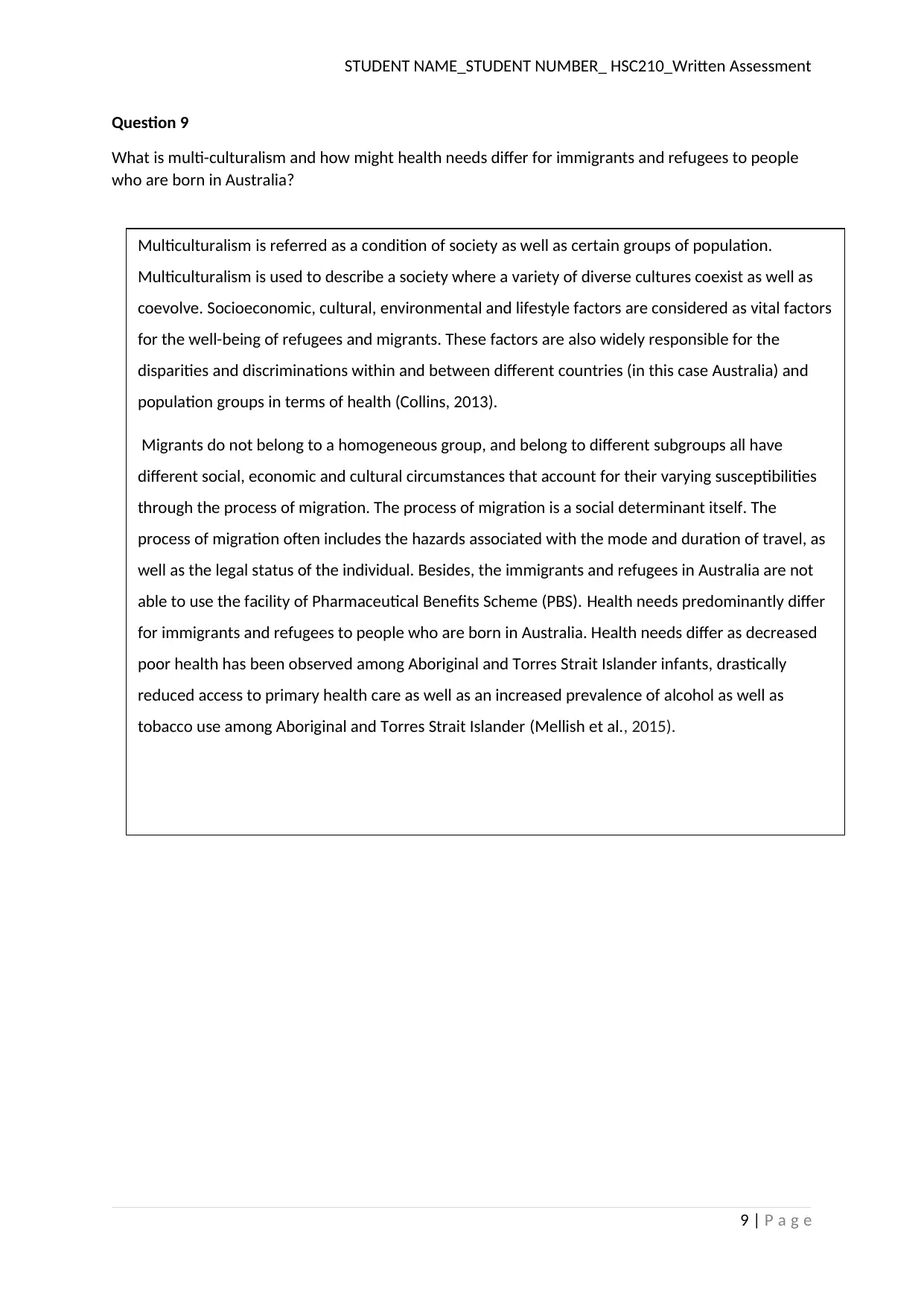
Multiculturalism is referred as a condition of society as well as certain groups of population.
Multiculturalism is used to describe a society where a variety of diverse cultures coexist as well as
coevolve. Socioeconomic, cultural, environmental and lifestyle factors are considered as vital factors
for the well-being of refugees and migrants. These factors are also widely responsible for the
disparities and discriminations within and between different countries (in this case Australia) and
population groups in terms of health (Collins, 2013).
Migrants do not belong to a homogeneous group, and belong to different subgroups all have
different social, economic and cultural circumstances that account for their varying susceptibilities
through the process of migration. The process of migration is a social determinant itself. The
process of migration often includes the hazards associated with the mode and duration of travel, as
well as the legal status of the individual. Besides, the immigrants and refugees in Australia are not
able to use the facility of Pharmaceutical Benefits Scheme (PBS). Health needs predominantly differ
for immigrants and refugees to people who are born in Australia. Health needs differ as decreased
poor health has been observed among Aboriginal and Torres Strait Islander infants, drastically
reduced access to primary health care as well as an increased prevalence of alcohol as well as
tobacco use among Aboriginal and Torres Strait Islander (Mellish et al., 2015).
STUDENT NAME_STUDENT NUMBER_ HSC210_Written Assessment
Question 9
What is multi-culturalism and how might health needs differ for immigrants and refugees to people
who are born in Australia?
9 | P a g e
Multiculturalism is used to describe a society where a variety of diverse cultures coexist as well as
coevolve. Socioeconomic, cultural, environmental and lifestyle factors are considered as vital factors
for the well-being of refugees and migrants. These factors are also widely responsible for the
disparities and discriminations within and between different countries (in this case Australia) and
population groups in terms of health (Collins, 2013).
Migrants do not belong to a homogeneous group, and belong to different subgroups all have
different social, economic and cultural circumstances that account for their varying susceptibilities
through the process of migration. The process of migration is a social determinant itself. The
process of migration often includes the hazards associated with the mode and duration of travel, as
well as the legal status of the individual. Besides, the immigrants and refugees in Australia are not
able to use the facility of Pharmaceutical Benefits Scheme (PBS). Health needs predominantly differ
for immigrants and refugees to people who are born in Australia. Health needs differ as decreased
poor health has been observed among Aboriginal and Torres Strait Islander infants, drastically
reduced access to primary health care as well as an increased prevalence of alcohol as well as
tobacco use among Aboriginal and Torres Strait Islander (Mellish et al., 2015).
STUDENT NAME_STUDENT NUMBER_ HSC210_Written Assessment
Question 9
What is multi-culturalism and how might health needs differ for immigrants and refugees to people
who are born in Australia?
9 | P a g e
⊘ This is a preview!⊘
Do you want full access?
Subscribe today to unlock all pages.

Trusted by 1+ million students worldwide
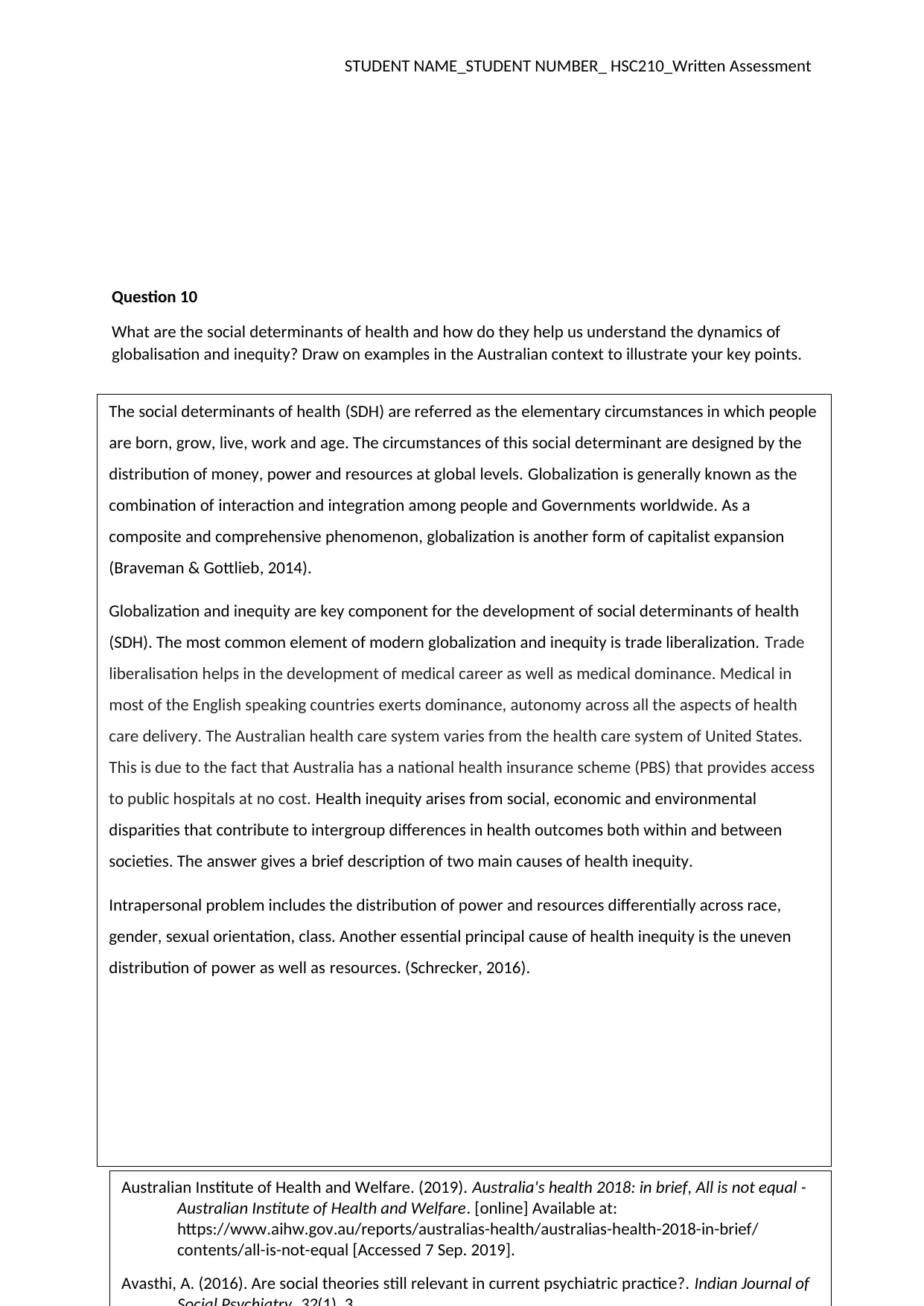
STUDENT NAME_STUDENT NUMBER_ HSC210_Written Assessment
Question 10
What are the social determinants of health and how do they help us understand the dynamics of
globalisation and inequity? Draw on examples in the Australian context to illustrate your key points.
References
10 | P a g e
The social determinants of health (SDH) are referred as the elementary circumstances in which people
are born, grow, live, work and age. The circumstances of this social determinant are designed by the
distribution of money, power and resources at global levels. Globalization is generally known as the
combination of interaction and integration among people and Governments worldwide. As a
composite and comprehensive phenomenon, globalization is another form of capitalist expansion
(Braveman & Gottlieb, 2014).
Globalization and inequity are key component for the development of social determinants of health
(SDH). The most common element of modern globalization and inequity is trade liberalization. Trade
liberalisation helps in the development of medical career as well as medical dominance. Medical in
most of the English speaking countries exerts dominance, autonomy across all the aspects of health
care delivery. The Australian health care system varies from the health care system of United States.
This is due to the fact that Australia has a national health insurance scheme (PBS) that provides access
to public hospitals at no cost. Health inequity arises from social, economic and environmental
disparities that contribute to intergroup differences in health outcomes both within and between
societies. The answer gives a brief description of two main causes of health inequity.
Intrapersonal problem includes the distribution of power and resources differentially across race,
gender, sexual orientation, class. Another essential principal cause of health inequity is the uneven
distribution of power as well as resources. (Schrecker, 2016).
Australian Institute of Health and Welfare. (2019). Australia's health 2018: in brief, All is not equal -
Australian Institute of Health and Welfare. [online] Available at:
https://www.aihw.gov.au/reports/australias-health/australias-health-2018-in-brief/
contents/all-is-not-equal [Accessed 7 Sep. 2019].
Avasthi, A. (2016). Are social theories still relevant in current psychiatric practice?. Indian Journal of
Question 10
What are the social determinants of health and how do they help us understand the dynamics of
globalisation and inequity? Draw on examples in the Australian context to illustrate your key points.
References
10 | P a g e
The social determinants of health (SDH) are referred as the elementary circumstances in which people
are born, grow, live, work and age. The circumstances of this social determinant are designed by the
distribution of money, power and resources at global levels. Globalization is generally known as the
combination of interaction and integration among people and Governments worldwide. As a
composite and comprehensive phenomenon, globalization is another form of capitalist expansion
(Braveman & Gottlieb, 2014).
Globalization and inequity are key component for the development of social determinants of health
(SDH). The most common element of modern globalization and inequity is trade liberalization. Trade
liberalisation helps in the development of medical career as well as medical dominance. Medical in
most of the English speaking countries exerts dominance, autonomy across all the aspects of health
care delivery. The Australian health care system varies from the health care system of United States.
This is due to the fact that Australia has a national health insurance scheme (PBS) that provides access
to public hospitals at no cost. Health inequity arises from social, economic and environmental
disparities that contribute to intergroup differences in health outcomes both within and between
societies. The answer gives a brief description of two main causes of health inequity.
Intrapersonal problem includes the distribution of power and resources differentially across race,
gender, sexual orientation, class. Another essential principal cause of health inequity is the uneven
distribution of power as well as resources. (Schrecker, 2016).
Australian Institute of Health and Welfare. (2019). Australia's health 2018: in brief, All is not equal -
Australian Institute of Health and Welfare. [online] Available at:
https://www.aihw.gov.au/reports/australias-health/australias-health-2018-in-brief/
contents/all-is-not-equal [Accessed 7 Sep. 2019].
Avasthi, A. (2016). Are social theories still relevant in current psychiatric practice?. Indian Journal of
Paraphrase This Document
Need a fresh take? Get an instant paraphrase of this document with our AI Paraphraser
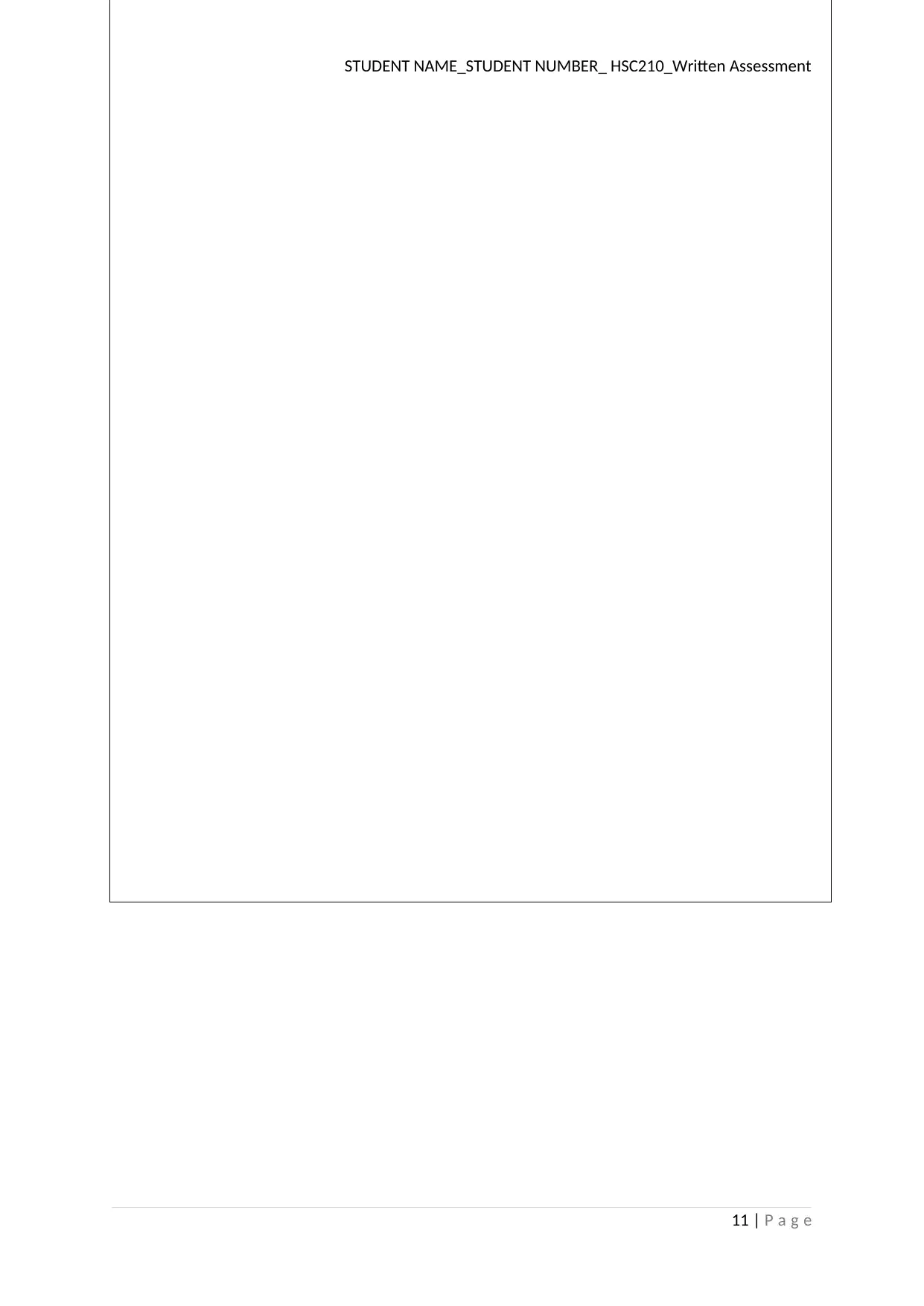
STUDENT NAME_STUDENT NUMBER_ HSC210_Written Assessment
11 | P a g e
11 | P a g e
1 out of 11
Related Documents
Your All-in-One AI-Powered Toolkit for Academic Success.
+13062052269
info@desklib.com
Available 24*7 on WhatsApp / Email
![[object Object]](/_next/static/media/star-bottom.7253800d.svg)
Unlock your academic potential
Copyright © 2020–2026 A2Z Services. All Rights Reserved. Developed and managed by ZUCOL.





